
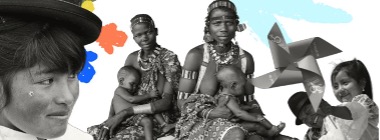
Editor’s Note
The focus in this month’s Bulletin is the International Day of the World’s Indigenous Peoples, 9 August. We also take a look back at World Refugee Day with a Blog by Avril Bellinger, post another personal story by Kirungi Ngonzi Violet, and address human rights implications and responses to the verdict of the US Supreme Court rescinding the right to abortion choice.
Table of Contents
Special Section: World Refugee Day
- August 9 International Day of the World’s Indigenous Peoples
- Blog on regufees
- Story by Kirungi Ngonzi Violet
GNPHR NEWS AND EVENTS
Psychology Organizations and Human Rights
The GNPHR Network of Human Rights Groups in Psychology Associations is open to representatives of psychology associations that have established a committee, office, or subgroup focused on psychology and human rights. We had an initial meeting in February 2022, and another one in June. Both were attended by representatives of different psychology associations. You can read the minutes of the two meetings here: https://humanrightspsychology.org/resources/human-rights-activities-within-psych-organizations/
At the last meeting the group agreed to establish a framework for collaborating with associations who wish to establish a human rights and psychology group. So, if you know of associations who are interested in setting up such a group, please send an email here [tonyemail] to learn more and receive an invitation to the meetings of the Network of Human Rights Groups in Associations. Network members agreed to share their work plans, terms of reference, and other useful materials; these will be posted on the website.
The Network planning group (to organise future meetings) consists of Tony Wainwright from the GNPHR Steering Committee, Elaine Rogers from the Irish Psychological Association, and Khalid Juma from the Zanzibar Psychological Counselling Association. Meetings will be every other month, starting in September 2022. The time zones will alternate. We ask those interested to register on ZOOM for the meetings. Thursday 1st September 1.00 pm Central European Time (CET); Thursday 3rd November, 8.00 pm CET
If you are interested in coming to one of the next meetings, please go to this link and we will be in touch.
Webinar Series – Human Rights and Psychology
Next Webinar: September 21, 2022 – 10 am EDT, 4 pm CET
Human Rights and Psychological Ethics- Working Together for a Better World – Janel Gauthier and Carole Sinclair, Canada
Register here
View all webinars in series here https://humanrightspsychology.org/webinarseries
Nominate for the *NEW* Human Rights Award
The International Council of Psychologists inaugurated a new Human Rights Award to recognize significant contributions by individual psychologists or organizations. Deadline 31 August, 2022. URL for the AWARD: https://icpweb.org/awards/human-rights-award/
SPECIAL SECTION

International Day of the World’s Indigenous Peoples 9 August
(https://www.un.org/en/observances/indigenous-day)
On 23 December 1994, the United Nations General Assembly decided, in its resolution 49/214, that the International Day of the World’s Indigenous People shall be observed on 9 August every year. The date marks the day of the first meeting, in 1982, of the UN Working Group on Indigenous Populations.
On this day, people from around the world are encouraged to spread the UN’s message on the protection and promotion of the rights of indigenous peoples.
2022 Theme: The role of indigenous women in the preservation and transmission of traditional knowledge
Indigenous women are the backbone of indigenous peoples’ communities and play a crucial role in the preservation and transmission of traditional ancestral knowledge. They have an integral collective and community role as carers of natural resources and keepers of scientific knowledge. Many indigenous women are also taking the lead in the defence of indigenous peoples’ lands and territories and advocating for indigenous peoples’ collective rights worldwide.
Respect, not dehumanization
The ’Fight Racism’ campaign offers a section dedicated to indigenous communities with a comprehensive compilation of UN resources.
UNESCO: Indigenous Peoples around the world https://www.unesco.org/en/days/indigenous-people-day
Indigenous peoples live in all regions of the world and own, occupy or use some 22% of global land area. Numbering at least 370-500 million, indigenous peoples represent the greater part of the world’s cultural diversity, and have created and speak the major share of the world’s almost 7000 languages. Many indigenous peoples continue to be confronted with marginalization, extreme poverty and other human rights violations. Through partnerships with indigenous peoples, UNESCO seeks to support them in addressing the multiple challenges they face, while acknowledging their significant role in sustaining the diversity of the world’s cultural and biological landscape.
Geneva Environment Network – more about International ay of the Worlds’ Indigenous Peoples: https://www.genevaenvironmentnetwork.org/resources/updates/international-day-of-the-worlds-indigenous-peoples/
Climate change, deforestation, pollution, development and loss of diversity are serious threats to indigenous peoples due to their dependence on the environment and the resources of the lands and territories. It causes the loss of traditional knowledge, disintegrating traditional governance structures and their cultures.
Stoking the Fires for Maori & Pacific Student Success in Psychology
https://eric.ed.gov/?q=indigenous+people+psychology&id=EJ1280651 Waiari, Danielle Amare Kahurangi; Lim, Wern Tje; Thomson-Baker, Aliesha Polly; Freestone, Maddison Kiri; Thompson, Shauney; Manuela, Sam; Mayeda, David; Purdy (Te Rarawa, Ngai Takoto), Suzanne; Le Grice (Ngapuhi, Te Rarawa), Jade. Routledge, Higher Education Research and Development, 2021.
This study investigates Maori (Indigenous people of New Zealand) and Pacific (people living in New Zealand who identify with Pacific Islands heritage) student success in Psychology at The University of Auckland, casting a net around the barriers and facilitators of academic learning to better understand and delineate pathways to transform the institutional environment, fostering conditions that allow undergraduate students to flourish and access culturally specific support. Located within a university context, our methodology was informed by kaupapa Maori research, involving six focus groups with Maori and Pacific undergraduate students (n = 29), and a collaborative approach to thematic analysis. Five key themes were identified: Resisting individualising pressures and embracing whanaungatanga, facilitating ako and va, collaborative learning relationships, embracing Maori and Pacific expertise and knowledge systems, and recalibrating Maori and Pacific psychology pathways. This study is unique in its approach, being led by Maori, Pacific, and Indigenous students, foregrounding limitations and enhancers within a dominant monocultural institution. Suggestions for universities seeking to forge pathways that support Maori and Pacific student success without separating from their cultural identity are offered.
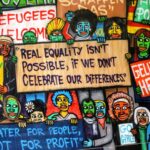 Blog on Refugees
Blog on Refugees
World Refugee Day – An opportunity for learning
By Avril Bellinger, a social worker, academic activist and founder of Students and Refugees Together (START) in Plymouth, UK. She is an honorary associate professor in social work and co-author of The Strengths Approach in Practice: How it changes lives, (2022) Policy Press.
Reflecting on Refugee Week in Plymouth, UK, marking the importance of World Refugee Day on 20th July 2022, I recall the joyful gathering of adults and children at cultural kitchen, the cooking and eating together, sharing stories, hopes and achievements – a child’s pride in her certificate and her mother’s excitement and trepidation about a new career – staff and volunteers from different agencies in the city collaborating and building strength for the difficult times to come – students from social care, geography and arts sharing their learning about displacement and belonging – echoing the United Nations statement for World Refugee Day, I truly ‘celebrate the strength and courage of people who have been forced to leave their home country to escape conflict, terror or persecution’. At the same time I am worried about our tendency to distance ourselves by ‘othering’ – labelling, demonising or glorifying people who have been forcibly displaced as a way of protecting ourselves from the realisation that this could be us.
READ MORE
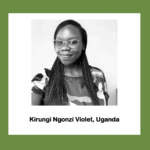 Story
Story
A Journey of a Psychologist
Kirungi Ngonzi Violet, Community Psychologist/Psychosocial Officer, Lutheran World Federation Uganda Program, Department of World Service, Adjumani Sub-program.
A JOURNEY OF A PSYCHOLOGIST: Supporting persons of concern is a passion that developed when I joined the West Nile refugee operation in Uganda. With the end of the emergency phase, more mental health issues started to emerge as the number of suicide cases increased as a result of factors such as financial constraints, selection criteria for support among others…. Recognizing the already existing resources within the community and making use of them has helped me to offer more relevant and suitable services to the refugee communities. …. optimum mental health and psychological well-being are what I strive for both for myself and the community around me.
READ MORE
CONTENT AREAS AND NEWS
General
Is Identity Politics a Force For Good? Judith Butler, Cornel West, and Glenn Greenwald join moderator Simon Critchley in the 2021 Holberg Debate. Public Seminar, July 18, 2022.
A fierce debate over social justice and identity-based politics seems to have exploded in recent years in the Western world, and few areas of life remain untouched by cultural conflicts. To some, identity-based politics has been embraced as an effective strategy to combat discrimination and marginalization. To others, it may seem that identity politics has resulted in culture wars involving violent conflicts and a destructive exchange of labels.
Network Reflections: American Psychological Association, Scholars at Risk, July 2022
How can psychology be used to make a positive impact on critical social issues, including advancing human rights? The American Psychological Association (APA), through its long-term partnership with SAR, has spearheaded efforts to promote the rights, mental health, and well-being of scholars, human rights defenders, and other civic actors at risk. In response to recent crises, APA advocated for the evacuation of several Afghan mental health professionals facing death threats due to their collaboration with Western institutions and supported Ukrainian colleagues at the National Psychological Association of Ukraine to share resources and form a mental health hotline.
Lectures: Toby Mendel (Human Rights Lawyer, Director of the Centre for Law and Democracy, Canada) – Do the Human Rights to Reputation and Privacy Apply to the Dead?; Prof. dr. A.H.M. (Antoon) de Baets, Professor em. of History, Ethics and Human Rights, University of Groningen; Founder of the Network of Concerned Historians) – Stale Epigrams? The View of the Past in the Historical Recitals of Human Rights Instruments.
Academic Freedom / Higher Education
Irish and Dutch education reforms ‘threaten university autonomy’. Institutions in the European countries face ‘contamination’ as governments group them with more regulated parts of the education system. Ben Upton, Times Higher Education, July 19, 2022.
Moves in two separate European countries to give authorities power to intervene in the management of universities have raised fears about institutional autonomy. In early July, the lower house of the Dutch parliament approved a draft bill that would give the education minister the power to fire the heads of educational institutions accused of maladministration without having to get court approval. Meanwhile, in Ireland, a draft bill overhauling higher education regulation for the first time in 50 years would grant the chief executive of the Higher Education Authority (HEA) the power to cut funding from universities seen to be straying from the rules.
Fostering Research Integrity through the promotion of fairness, equity and diversity in research collaborations and contexts: Towards a Cape Town Statement
The World Conferences on Research Integrity have produced significant collaborative conference statements including the Singapore Statement on Research Integrity and more recently the Hong Principles on Researcher Assessment. The 7th World Conference on Research Integrity (7WCRI) takes place in Cape Town from the 29th May 2022 to 1st June 2022. The theme of the conference is Fostering Research in an unequal world. We have proposed the Cape Town statement on Fostering Research Integrity through the promotion of fairness, equity and diversity in research collaborations and contexts as the major collaborative output for this conference. This paper serves to introduce the reader and conference attendees to the motivation and thinking behind this proposal which will be discussed further at the conference. The proposed Cape Town Statement needs to accomplish two aims. First it must clearly demonstrate why inequity and unfair practices in research collaborations and contexts is a research integrity (RI) matter. Second it must identify some key values or principles and action guides that will address the issue of equity and fairness in research within the context of the complete research life cycle from research agenda setting and call to proposal development, through grant application, allocation and management of funding, data production, analysis, management and sharing, to outputs, translation, and evaluation.
Rectors for moral development ‘sign of Russia’s re-Sovietisation’. Pola Lem, Times Higher Education, June 22, 2022. Pro Rector position will be used to ‘keep universities on a shorter leash’ and ‘pre-empt any potential dissent’, academics say.
Coined during the USSR era, the position of pro rector in charge of vospitatel’naya rabota – which roughly translates as “character-building” – was once a common fixture at universities. Such individuals were tasked with benign activities, such as organising volunteering and student scholarships, as well as more insidious ones, namely, inculcating state propaganda in their young charges.
The post still exists at many universities, but now, it will be mandatory at all of them. Announcing the measure, Russian’s deputy minister of education Petr Kucherenko emphasised the importance of developing students not only as specialists in their fields, but also as “fully-fledged citizens of Russian society”, according to state media. Scholars said that the move recalled times when Communist Russia intervened more heavily to shape young people’s worldview.
Climate Justice
The secretary general of the UN welcomed the adoption by the General Assembly that access to a clean and healthy environment was a universal human right.
The resolution, based on a similar text adopted last year by the Human Rights Council, calls upon States, international organisations, and business enterprises to scale up efforts to ensure a healthy environment for all. The UN Secretary-General, António Guterres, welcomed the ‘historic’ decision and said the landmark development demonstrates that Member States can come together in the collective fight against the triple planetary crisis of climate change, biodiversity loss and pollution. The decision will also help States accelerate the implementation of their environmental and human rights obligations and commitments.”
For more information see:
- Special Rapporteur on human rights and the environment, https://www.ohchr.org/en/special-procedures/sr-environment
- The right to a healthy environment, https://news.un.org/en/story/2021/10/1103082
- Report from the UN General Assembly July 2022, https://news.un.org/en/story/2022/07/1123482
- The GNPHR site, https://humanrightspsychology.org/content-areas/climate-justice1/
It’s Already Happening”: Ugandan Activist Vanessa Nakate on Deadly Climate Crisis in Africa. Democracy now, July 21, 2022.
As heat waves scorch much of the globe, we look at who bears the brunt of the climate emergency and go to Kampala, Uganda, to speak with climate justice activist Vanessa Nakate. “The climate crisis has been here. It has been impacting the lives of so many people on the African continent, which is responsible for less than 4% of the global emissions,” says Nakate. “Media has a huge responsibility to cover the climate crisis, but it has a much bigger responsibility to cover the climate crisis in the places where people are already suffering some of the worst impacts.” This comes as a new study finds U.S. greenhouse emissions have caused nearly $2 trillion in damages to other, mostly poor, countries.
Crimes against humanity
Myanmar: The Rohingya’s Decade of Detention. Human Rights Watch, June 10, 2022
The Myanmar authorities have detained over 135,000 Rohingya and Kaman Muslims arbitrarily and indefinitely in Rakhine State for a decade, Human Rights Watch said in a web feature released today. Drawing on interviews with Rohingya and humanitarian workers from 2012 to the present, Human Rights Watch documents how the authorities have capitalized on the ethnic cleansing campaign launched in June 2012 to segregate and confine a population they had long sought to remove from daily life in the predominantly Buddhist country.
A French University Confronts Medical Crimes and Its Nazi Past. Aurelien Breeden, NY Times, 24 July 2022.
A report on the University of Strasbourg’s takeover by Nazis during World War II and on medical crimes they committed there sheds light on a period that had been mostly scrubbed from official memory. For decades, students at the prestigious University of Strasbourg swapped rumors that human remains from Nazi victims, preserved as anatomical or pathological specimens, were still somewhere on campus. There was reason for suspicion. When Germany annexed the Alsace region of France in 1940, it had poured in money and resources to transform the university into a model Nazi institution: the Reichsuniversität Strassburg.
From 1941 to 1944, professors on the medical faculty there forced at least 250 people from concentration or death camps to undergo experiments, some involving chemical weapons like mustard gas or deadly diseases like typhus. Eighty-six Jews, brought from Auschwitz, were murdered at a nearby camp for a planned skeleton collection.
But a full account of what transpired during those years was hard to come by. In May, the university released a 500-page report that deeply recasts the way it views itself and states out loud what had previously only been whispered: that people from Alsace had worked at the Reichsuniversität too, that the medical crimes its professors committed were extensive, and that the school had worked closely with a nearby concentration camp.
Decolonization / Indigenization
‘Moral evil, economic good’: Whitewashing the sins of colonialism. Sabelo J MNdlovu-Gatsheni, Aljazeera, February 2021.
How war, violence and extractivism defined the legacy of the empire in Africa, and why recent attempts to explore the ‘ethical’ contributions of colonialism risk rewriting history and undermining progress. Sabelo Ndlovu-Gatsheni, Al Jazeera, February 2021. (Ndlovu-Gatsheni , Chair for Epistemologies of the Global South, University of Bayreuth)
In 2017, a professor at Oxford University in the United Kingdom proposed a research project. The key thesis: that the empire as a historical phenomenon – distinct from an ideological construct – has made ethical contributions and that its legacy cannot be reduced to that of genocides, exploitations, domination and repression. Expectedly, such a project raised a lot of controversies to the extent that other scholars at Oxford penned an open letter dissociating themselves from such intended revisionism and whitewashing of the crimes of the empire. One leading member of the project resigned from it, citing personal reasons.
.. [I]it is the continuation of revisionist thinking that beckons a revisiting of the question of colonialism and its impact on the continent from a decolonial perspective, challenging the colonial and liberal desire to rearticulate the empire as an ethical phenomenon.
LGBTQI+, Gender Rights
How Kyiv’s L.G.B.T.Q. Community Found Shelter from the Russian Invasion. An advocacy group in Ukraine’s capital retools itself as a service organization. Masha Gessen, The New Yorker, June 14, 2022.
War is a great enforcer of gender rules. After Russia invaded, Ukraine immediately barred able-bodied men under the age of sixty from leaving the country. Some of them would be mobilized—but what would happen to trans people? Much would depend on what gender marker they had in their documents. Judis Anderson, a twenty-four-year-old trans woman, tried to leave Ukraine in the first month of the invasion. “At the border, they didn’t believe that I’m trans,” she said. Anderson, who has been taking hormonal therapy for three years, still has the male gender marker in her identity documents. She is skinny; she wears her pink hair long. “They pulled on my hair to see if it was real, felt up my breasts. Then they said, ‘Get lost or we’ll call the police.’ ”
Anderson had been living in Kyiv, which was now under siege; she had stayed in a communal apartment in a basement, but with the start of the war it was turned into a bomb shelter. For a time, she and a friend, also a trans woman, had squatted in an abandoned house in a village, keeping warm and cooking on a wood stove. Once she returned to the capital from the border, she started working on changing the gender marker in her documents. The process involves being evaluated by psychiatrists, an endocrinologist, and a general physician. When Anderson gets her new documents, though, she no longer plans to leave the country—she hopes to enlist. “I want to go fight,” she said. “But as a woman.”
Violence and War
Situation of Human Rights in Ukraine in the context of the armed attack by the Russian federation 24 February – 15 may 2022. Office of the High Commissioner for Human Rights, 29 June 2022.
This report by the Office of the High Commissioner for Human Rights (OHCHR) covers violations of international humanitarian law (IHL) and international human rights law that have occurred in the course of the ongoing armed attack by the Russian Federation against Ukraine. It covers the period from 24 February 2022 until 15 May 2022 and is based on the work of the United Nations Human Rights Monitoring Mission in Ukraine.
Women and Human Rights
APA decries SCOTUS decision on abortion. Open letter by the APA. Restrictions on access to reproductive care will worsen mental health
Washington — The American Psychological Association expressed deep concern and profound disappointment in response to the U.S. Supreme Court’s decision eliminating the constitutional right to abortion.
“This ruling ignores not only precedent but science, and will exacerbate the mental health crisis America is already experiencing,” said APA President Frank C. Worrell, PhD. “We are alarmed that the justices would nullify Roe despite decades of scientific research demonstrating that people who are denied abortions are more likely to experience higher levels of anxiety, lower life satisfaction and lower self-esteem compared with those who are able to obtain abortions.”
The facts about abortion and mental health. Zara Adams, APA vol. 53, 26 July 2022.
Scientific research from around the world shows having an abortion is not linked to mental health issues but restricting access is.
Women, the Game Is Rigged. It’s Time We Stop Playing by the Rules. Lux Alptraum
Ms. Alptraum is the author of ‘Faking It: The Lies Women Tell About Sex — and the Truths They Reveal.’ NY Times, July 29, 2022.
For most of the 21st century, the feminism that has been in fashion has leaned heavily on the idea of women’s empowerment. Glossy, celebrity-driven rhetoric, peppered with slogans like “nevertheless, she persisted” and reassurances that “girl, you got this,” suggests that if women display competence and strength — or even just “the confidence of a mediocre white man”— we will eventually earn equality. This type of feminism has taken several forms — Lean In, the Women’s March, the girlboss and hashtag feminism, just to name a few iterations. But the ultimate promise has remained the same: If we work within the system, the system will reward us. If we hustle hard enough, vote hard enough, carry ourselves with enough confidence, show that the data is on our side and bravely share uncomfortable truths, we’ll be able to break through.
Adherents of empowerment feminism can point to many successes: In 2022, more than a quarter of the seats in Congress, almost a third of the seats in state legislatures, nearly half of the seats on the Supreme Court and, yes, the vice president’s office are all occupied by women. The list of female chief executives leading Fortune 500 companies continues to grow (though it remains abysmal). And as the #MeToo movement has made clear, when women speak up in great enough numbers, we’re able to topple some of our abusers — even incredibly powerful ones, like the once untouchable film mogul Harvey Weinstein.
And yet as we stand amid the metaphorical shards of all those shattered glass ceilings, it’s hard to ignore the fact that empowerment feminism hasn’t really delivered on its promises.
PUBLICATIONS
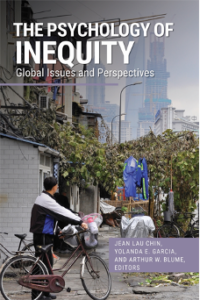 The Psychology of Inequity. Global Issues and Perspectives. Jean Lau Chin, Yolanda E. Garcia, and Arthur W. Blume, Editors. September 2022, Praeger.
The Psychology of Inequity. Global Issues and Perspectives. Jean Lau Chin, Yolanda E. Garcia, and Arthur W. Blume, Editors. September 2022, Praeger.
The Psychology of Inequity: Global Issues and Perspectives examines the psychological consequences of inequity beyond the borders of the United States and other western nations. Inequity does not end at national borders; it is a global problem that reflects the interdependent nature of our planetary existence. This book advances our understanding of psychological inequity as a global problem requiring global solutions.
 The Colonialism of Human Rights. Ongoing Hypocrisies of Western Liberalism. Colin Samson.
The Colonialism of Human Rights. Ongoing Hypocrisies of Western Liberalism. Colin Samson.
Do so-called universal human rights apply to indigenous, formerly enslaved and colonized peoples?
This trenchant book brings human rights into conversation with the histories and afterlives of Western colonialism and slavery. Colin Samson examines the paradox that the nations that credit themselves with formulating universal human rights were colonial powers, settler colonists and sponsors of enslavement. Samson points out that many liberal theorists supported colonialism and slavery, and how this illiberalism plays out today in selective, often racist processes of recognition and enforcement of human rights.
Upcoming Events
MSCA4Ukraine Fellowship Programme: Preliminary information for applicants
As part of the EU’s response to the Russian Federation’s invasion of Ukraine, a new dedicated fellowship scheme — MSCA4Ukraine — will provide support to displaced researchers from Ukraine. This support will enable displaced researchers to continue their work at academic and non-academic organisations in EU Member States and Horizon Europe Associated Countries, while maintaining their connections to research and innovation communities in Ukraine. The scheme may also facilitate researchers’ reintegration in Ukraine if conditions for safe return are met, in order to prevent permanent brain drain, and contribute to strengthening the Ukrainian university and research sector and its collaboration and exchange with the international research community.
It is anticipated that a call for applications will be issued in September.
Sept 28-29: INTERNATIONAL CONFERENCE Diversity – Equity – Inclusion
Problems, needs, barriers, and perspectives for inclusion of students with impairments.
Kraków, 27th-28th September, 2022, organized as part of the project Academy of Equal Chances and held with the endorsement of Andrzej Frycz Modrzewski Krakow University.
As conference organizers we find a complex and multidimensional nature of issues related to full participation of young people with disabilities in university education a good basis for fruitful discussions. The conference will be opportunity for specialists representing various academic disciplines and business sectors to discuss their experiences, ideas, and thoughts with other members of the international community. Particularly, we address our invitation to scholars – sociologists, psychologists, special education teachers, healthcare professionals, lawyers, architects, and all those who act for social inclusion of people with disabilities and their equality in access to higher education and the experience of studying.
The conference is organised as part of the ‘Academy of Equal Chances’ project, co-financed by the European Union under the European Social Fund, Operational Programme Knowledge Education Development 2014-2020, Priority Axis III. Higher education for economy and development, Measure 3.5 Comprehensive programmes of higher education institution.
November 6-9: 9th World Congress on Women’s Mental Health
International Association for Women’s Mental Health
6 – 9 November 2022 | MECC Maastricht – The Netherlands
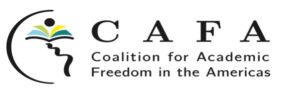 November 15-16; Coalition for Academic Freedom in the Americas (español)
November 15-16; Coalition for Academic Freedom in the Americas (español)
Save the date!
Join Scholars at Risk and our partners on the for an inaugural regional conference on academic freedom in the Americas this November 10th and 11th. The event will take place online and in person, at Universidad de Monterrey, Mexico. The Coalition–led by University of Ottawa’s Human Rights Research and Education Centre, Universidad de Monterrey, and SAR–will bring together civil society, researchers, academics, and students for this hybrid event, which will set the agenda for best practices in protecting and promoting academic freedom in the region.
We are currently seeking applications from prospective panelists and would welcome a wide range of contributions, from country-focused assessments of academic freedom to the adoption of academic freedom policies by higher education institutions. To contribute to the conference, make a submission in response to this call for papers. Follow @CAFA-CLAA to learn more.
And more good news. The Coalition has been invited by the Inter-American Commission on Human Rights (IACHR) to be a part of an academic network and to support their work monitoring and implementing the new Inter-American Principles on Academic Freedom and University Autonomy throughout the region. This network was established in 2021, with SAR and its partners as inaugural members. The invitation to engage for a second year in this work and maintain our partnership with the IACHR is a significant positive sign for our work in the Americas going forward. All work we couldn’t be doing without each of you.
NOVEMBER 17-19, 2022: 17th Symposium on the Contributions of Psychology to Peace
Peace Psychology and Global Challenges in 2022, 17-19 November 2022, Online
The theme of the International Network of Peace Psychology’s 17th biennial symposium is “Peace Psychology and Global Challenges in 2022.” The event will be held online over three days from 17-19 November (18-20 November for those in Australia/New Zealand). The symposium aims to bring together scholars, practitioners, and activists committed to promoting peace and social justice through their research and practice to discuss the pressing issues facing our world today. Invited speakers include Prof. Winnifred Louis, Prof. Wilson López, and Prof. Emeritus Dan Christie.
Call for Abstracts
The symposium organisers are currently seeking abstract submissions to the following streams:
- Young people and peace
- Culture, religion and peace-building
- Social movements and political and social transformation
- War, conflict and peace-building
To submit your abstract, please complete this form. Abstract submissions close on 31 August 2022.
Submissions from presenters living in countries affected by armed conflict are encouraged. Accepted presentations may contribute to a special issue of Peace and Conflict: Journal of Peace Psychology.
ICP2022 – December 9-11.2022
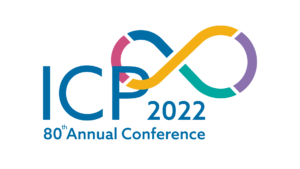 Dear Colleagues,
Dear Colleagues,
We invite you to submit proposals for short talks or posters for the International Council of Psychologists 2022 Annual Conference (December 9-11). Proposals are due by July 1st. You can find more information here: https://icpweb.org/icp-annual-conference/icp2022/
Come join together to explore Human Rights, Dignity & Justice: Strategies for Sustainability with talks, discussion and networking.
CONTACTS: Published by the Global Network of Psychologists for Human Rights – www.humanrightspsychology.org
Disclaimer: The website of the Global Network of Psychologists for Human Rights (GNPHR) contains articles, events and news about the domain where psychology and human rights intersect. The information presented in this Bulletin, does not imply that the GNPHR shares the views and beliefs in the articles.
- @GNPHR1
- How to get involved – read how you can contribute to the global network
- Consider contributing a Blog/Commentary
- News and Bulletins from the GNPHR – Subscribe to GNPHR
- Email addresses:
Ways to Participate in Global Network Activities
- Student/young person representation on the GNPHR Steering Committee
Are you a student or young person (under 35 years of age) interested in joining the GNPHR Steering Committee? The GNPHR invites applications. Role description: The terms of reference broadly define the roles of all members of the steering group. Individual steering committee member tasks include : Each member will take responsibility for one of the following: (a) A specific content area or group of areas; (b) A specific project (e.g. survey of human rights reporting mechanisms; survey of educational programs in psychology/human rights, etc); (c) A specific function: for example, organizing a newsletter; soliciting commentary or newsletter blogs; seeking grant possibilities; outreach to general human rights organizations; outreach to psychology organizations or (d) Consultation: Working in collaboration with other organisations where there is a specific issue. In addition, from time-to-time, short-term subgroups may work on specific projects. In addition, for the student member, there would be a specific remit to liaise with other organisations that are focussed on younger people, psychology and human rights. Click here if you are interested in being nominated. - Share Your Experiences and Examples
One of the best ways to illustrate the intersection of psychology and human rights is through example. We are looking for examples of your encounters with human rights issues in your professional life. You might describe a time when you protected (or failed to protect) human rights, or advocated for what you saw as a human rights issue. The events might be in your clinical, research, academic, applied, or volunteer work. Please send your narrative / story (500-1000 words) to Marlena Plavšić (marlena_plavsic@hotmail.com). We will compile these for publication in the GNPHR Bulletin and on the website. Please also indicate if you would like your stories to remain anonymous. - Share your Expertise and Opinions
We invite you to contribute a blog or opinion piece on general human rights issues; human rights education or strategies for raising the profile of human rights within psychology or your professional life. Students are welcome to contribute, including on student needs for learning about and addressing human rights. Please contact the GNPHR Blog editor (blogeditor@humanrightspsychology.org) with ideas for the article you would like to write! - Send articles/news/events
If you come across a human rights article or news, or know of an upcoming hunman rights event, please send for publication in the Bulletin. Send to the Bulletin editor Polli Hagenaars (polli.hagenaars@gmail.com).

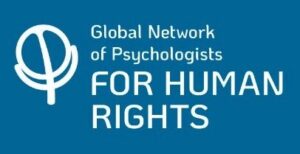
This is outstanding content!!!